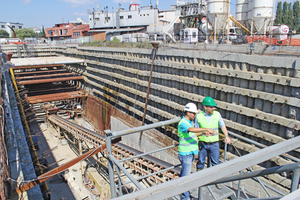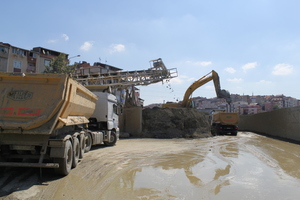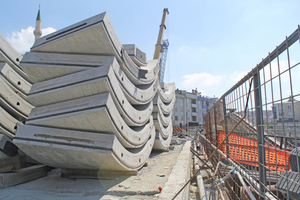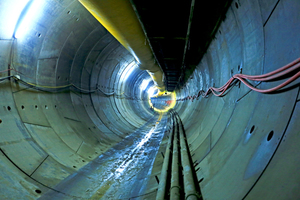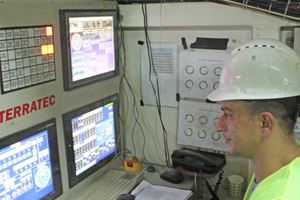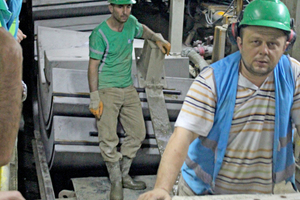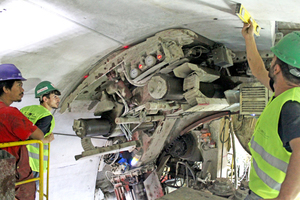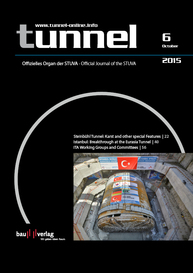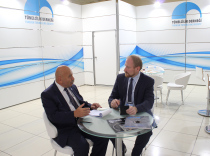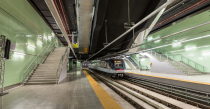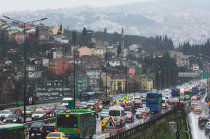Metro Tunnel DrivesMecidiyeköy-Mahmutbey
The district of Gaziösmanpaşa is located to the north-west of Istanbul’s historic city centre. From there the quickly growing metro system for the city of 14 million will be augmented by a further 17.5 km of underground railway with 15 stations. Work on the new Mecidiyeköy–Mahmutbey Metro line began in March 2014 planned by the Yuksel Proje engineering office and executed by a joint venture comprising the turkish companies Gülermak, Kolin and Kalyon (GKK).
Should everything run according to plan, the driving operations, which will probably cost the City of Istanbul around 300 million euros, will be completed by January/February 2017. In early September 2015, a good seven months after the initial driving operations were embarked on, progress had been made as foreseen without any problems worth mentioning, Sinan Acun, TBM Tunnel Chief for the metro project, told tunnel on site. The site was the starting point for all three tunnel boring machines being used for the project. Later it will be developed to become the future Yeni Mahalle Station.
35 km produced by TBM and Drill+Blast
35-year old Sinan Acun is responsible for excavating 18 km of the altogether 35 km long tunnel route, which runs in two parallel tubes. The remaining 17 km are being built by drill+blast since mid-March – towards this end, a workforce of around 1000 is currently engaged. The new Metro line will only run on the surface at two places for altogether almost 500 m.
Far less manpower is involved – around 300 according to Sinan Acun – in the TBM sections where three EPB TBMs are at work. Since the beginning of the year they have been driving 6.5 m diameter tunnels beneath the densely built-up city. Once the segments have been placed, in this way tunnel tubes with 5.7 m inner diameter will be created.
A complete ring is formed by five 1.4 m wide segments with a keystone. Once the mechanized drive is finished, 11,497 rings produced by Gülermak will line the TBM route bores, explains Acun.
Two used TBMs and a new One
While the belt conveyor systems carry the muck to the surface, where it is then transported by lorries from the Yeni Mahalle construction site, cranes lower the next load of segments from the awaiting MSV (multi service vehicles) to the bottom of the two 24 m deep starting shafts. This is the way everything has progressed in 12-h shifts around the clock since January 2015 when the first machine, a used and revamped Lovat TBM, started up towards Mahmutbey. On February 8, a Herrenknecht machine that had also been reconditioned, started driving in the same direction on a parallel route.
Both machines are each to tackle six tunnel kilometres. For this purpose they were serviced and reequipped beforehand by the Turkish company E-Berk Tunnel & Foundation Technologies. The TBMs had previously been used for constructing the Otogar– Bağcılar metroline in Istanbul. Within four months in 2014 the cutterheads of both machines were revised and adopted for the new project’s geological conditions, housings were removed and re-measured, new dressing set were assembled. Tail skins were also remeasured, foam and grease lines, tail brushes and spring plates renewed. Furthermore walk ways, conveyor band rollers and gantries were modified.
Some 2.1 km of Tunnel accomplished by late August
In the opposite starting shaft the launch commenced on March 12, 2015. Since then a new Terratec TBM has tackled 3 km underground in the direction of Veysel Karani. By the end of August the three TBMs and the drill+blast drives had jointly accomplished 2150 m of the 35 km that have to be completely excavated. In the process the machines had to penetrate three alternating geological formations: the Trakya formation, consisting of sandstone and siltstone, sections with layers of claystone, slit and sand and sections comprising sand, silt and marl.
Whereas the drive for the two revamped machines ends up at the western target station Mahmutbey, the Terratec machine – incidentally the first ever to be used in Turkey – has a second job to accomplish. As soon as it reaches its target, the 90 m long TBM will be lifted from the target shaft at Veysel Karani, dismantled and carried back to Yeni Mahalle to tackle the parallel tunnel tube, which is also 3 km in length.
Halftime reached by the Drive towards Veysel Karani
There’s quite some time till this happens; at the end of August only a half of the drive in the first tube had been accomplished. In this connection, one of the biggest challenges en route had been successfully tackled, which had awaited the tunnel boring machines in addition to a maximum gradient of in some cases 4.8 %: a 510 m long section with a curved radius of only 350 m – “an extremely narrow curve and a tricky task for the tunnelling team”, as TBM Chief Acun confirmed. When the Mecidiyekőy-Mahmutbey Metro line opens in 2018 six Istanbul suburbs will profit from the new Metro link, which is intended to have a capacity of 70 000 passengers per hour and direction.

